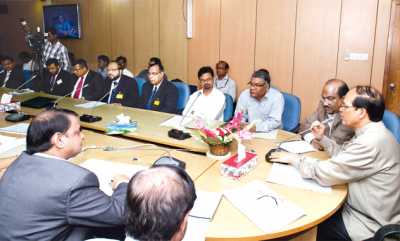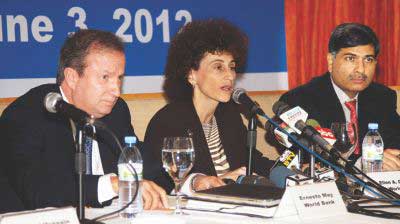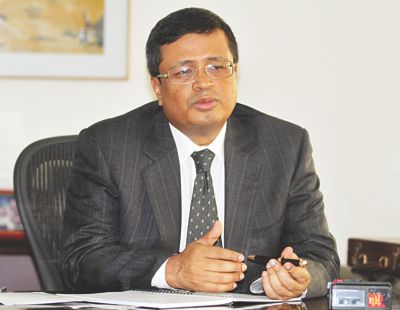Banking
Conventional banking based on ‘fragile structure’: Atiur
 Bangladesh Bank Governor Dr Atiur Rahman, speaks at launching of the Islami Interbank Fund Market (IIFM) at BB’s Jahangir Alam Conference Hall in Dhaka Sunday.
Bangladesh Bank Governor Dr Atiur Rahman, speaks at launching of the Islami Interbank Fund Market (IIFM) at BB’s Jahangir Alam Conference Hall in Dhaka Sunday.
Bangladesh Bank (BB) Governor Dr Atiur Rahman viewed the conventional banking as based on ‘fragile structure’ and hence, the world now rethinks of the Islamic banking in many cases.
“Even many non-Muslim countries are making the use of Islamic banking products such as ‘SUKUK’ in collecting fund from the market,” he said.
Dr Atiur Rahman came up with this view while inaugurating the transactions at Islamic Inter-banks Fund Market (IIFM) at Bangladesh Bank in Dhaka.
He said Islamic banking has seen rapid expansion in Bangladesh.
“Islamic banking system in Bangladesh currently covers 18.42 percent of total deposit and 21 percent of total asset in terms of loans and advances.”
The Islamic banks of the country have around 37.81 percent of total net inter-bank deposit, he said, adding that they also collected Tk 30 billion investment money from Islamic Bond Fund.
As the trades and businesses of Islamic banking have got expanded, BB governor emphasised the need to create inter-banking facilities for a stronger liquidity management in the Islamic banks.
BB Deputy Governor Abu Hena Md Razee Hasan presided over the function while Deputy Governor SK Sur Chowdhury and Managing Directors and CEOs of different Islamic banks, among others, were also present.
SK Sur Chowdhury said the IIFM has been launched with the objective of removing mismanagement in the liquidity system of Islamic banks.
Some of the Islamic banks and Islami wings of the conventional banks will deposit their fund in the market and others who need money will take funds from the market to meet their liquidity constraints while the central bank will play the role of custodian of the fund, he added.
Islamic bank Managing Director Mohammad Abdul Mannan said: “Today will be a red letter day in the country’s banking history as the IIFM is a long-cherished and demanded by the Islamic banks.”
He, however, demanded a separate Islamic Banking Act for the Islamic banks so that they can follow a uniform system.
The Daily Sun/Bangladesh/ 4th June 2012
Bangladesh's per capita income rises to $848
Bangladesh's per capita income went up to $848 in the current fiscal year from $816 last year, but is still way short of the $1,006 needed to pull the country up to the middle-income bracket.
The nation aims to reach the middle income country category by 2021, according to government's perspective plan.
The required per capita income at that time would be $1,300, meaning a growth rate of 7-5 percent to 8 percent is needed every fiscal year, said Zahid Hussain, senior economist of the World Bank.
Bangladesh managed a growth rate of 6.3 percent against a target of 7 percent this fiscal year, according to provisional data from Bangladesh Bureau of Statistics (BBS).
The previous year the growth rate was 6.71 percent, signifying the country went backwards with respect to its target of graduating to a middle income country status.
The Daily Star/Bangladesh/ 4th June 2012
Islamic banks get separate call money market
A new type of call money market -- Islamic Inter-bank Fund Market (IIFM) -- for sharia-based banks started its journey yesterday.
In such a market, transactions are based on profit instead of interest.
Bangladesh Bank Governor Atiur Rahman inaugurated the IIFM at the central bank.
On the first day, Islami Bank Bangladesh Ltd offered funds worth Tk 100 crore, while four banks applied for taking Tk 60 crore from the funds.
In December last year, the BB issued a circular about the IIFM but its launch was delayed due to a dearth of the required fund.
The BB governor said the IIFM has been formed in the model of the traditional call money market to remove the temporary and short-term liquidity crisis of the Islami Banks.
The Islamic Bond Fund of the central bank will act as the custodian of the IIFM and will not charge any fees for the fund.
According to rules, if any bank has excess fund, it will invest the amount in the IIFM for one day.
Another Islami Bank requiring fund will borrow the money from the IIFM for one day.
The rate of profit in the Islami Bank call money market will be determined on the basis of the profit the bank gives to its depositors on a three months' deposit.
Besides, the central bank has taken an initiative to amend Islamic Bond Rules 2004 to enable the Islamic banks and financial institutions to participate more in the Islamic financial market.
The central bank governor said the amendment to Islamic bond rules is now under consideration of the finance ministry and the changes will be finalised soon.
In recent times, Tk 32,000 crore to Tk 36,000 crore remains as excess liquidity with all commercial banks. Of the amount, around Tk 3,000 crore to Tk 4,000 crore is with the Islamic banks which they cannot invest and so the amount remains idle.
According to the central bank statistics, the Islami Banks account for around 18.42 percent or Tk 86,707 crore of the total deposits at all the banks.
The Daily Star/Bangladesh/ 4th June 2012
Efforts on to unlock $16b foreign aid: WB World Bank warns Bangladesh of risks stemming from Europe crisis
 World Bank Country Director Ellen Goldstein, middle, speaks at the launch of the lending agency's economic outlook report on Bangladesh at the Westin Hotel in Dhaka yesterday.
World Bank Country Director Ellen Goldstein, middle, speaks at the launch of the lending agency's economic outlook report on Bangladesh at the Westin Hotel in Dhaka yesterday.
The government and development partners are working on resolving the issues that have been holding back the disbursement of foreign aid of more than $16 billion, a top economist of the World Bank said yesterday.
“This is not very easy to fix, though,” Sanjay Kathuria, the WB's lead economist, said after launching the lending agency's economic outlook report on Bangladesh at the Westin Hotel in Dhaka yesterday.
The economist said most of the aid is tied with former projects that have various problems ranging from procurement to financial management.
“Issues of both sides are on our desks. We are working.,” said Kathuria, citing a recent high-level meeting between the parties.
The government is facing shortage of funds and hence cannot implement big infrastructure projects, like the Padma Bridge, Dhaka-Chittagong four lane highways and elevated expressway.
On the other hand, foreign aid in pipeline has reached as high as $16.61 billion as on March 31, according to Economic Relations Division.
The WB economist also talked about the poor levels of foreign direct investment (FDI) in Bangladesh.
“General environment for FDI is not very good here. Investors want transparent regulations, land and skilled people,” said Kathuria.
On allowing nine more new banks, the economist said the country has more than enough banks, and many of them are facing a liquidity crisis at the moment, he said.
“How the regulator supervises this big number of banks will be very challenging,” he said.
Kathuria also urged the government to go for more tariff liberalisation, which he said has been on the reverse trend for the past three years.
GLOBAL HEADWINDS
Zahid Hussain, a senior economist at the WB's Dhaka office, said the Bangladesh economy is facing four challenges -- three from external and one from internal aspects. These are: Eurozone crisis, turmoil in Gulf countries and oil price volatility; and energy crisis from the internal side.
A further deepening of the euro area crisis will put Bangladesh's economy at risk, Ellen Goldstein, country director of the World Bank for Bangladesh, said in a statement.
While Bangladesh's most recent economic growth is “quite healthy by developing country standards,” several headwinds could derail growth in near future, she said.
“The spillover effects of eurozone recession and oil price increases pose most serious downside risks to the economy,” she said.
Bangladesh's economic growth slowed to 6.3 percent in the fiscal year ending June 30, compared with 6.7 percent the previous year, according to provisional data from the Bangladesh Bureau of Statistics.
The economic outlook report also mentions the expansionary monetary and fiscal policies that have heightened inflationary pressures. Overall inflation is in double digits and non-food prices accelerated 14 percent in March 2012, compared to 4.3 percent a year earlier.
With exports starting to decline in March 2012, the WB said pressure on the balance of payments could intensify.
The current account surplus during July-March of this fiscal year was $456 million, when it stood at nearly $710 million during the same period last year. This is due to a sharp rise in petroleum-product imports needed to feed the liquid fuel-based power plants.
“The combination of current levels of inflation, the fiscal deficit and reserves mean that Bangladesh has very little policy space to respond to the crisis, unlike its situation during the last global economic and financial crises,” it said.
The Daily Star/Bangladesh/ 4th June 2012
Trust Bank plans to reach the unbanked Chief Executive Officer Shah Alam Sarwar shares its future plans with The Daily Star
 Shah Alam Sarwar
Shah Alam Sarwar
Trust Bank Ltd, one of the third generation private commercial banks of the country, plans to expand its reach by opening more rural branches, ATM booths and pay-points countrywide.
“We pursue a financial inclusion model in our business, and want to bring the unbanked population into the banking network through low-cost technology-based services,” said Shah Alam Sarwar, chief executive officer of the Bank.
Seventy branches of the Bank are now in operation and another 10 branches will be opened mostly in rural areas by 2012, Sarwar told The Daily Star in an interview at its head office in Dhaka recently.
"We are doing our core banking business with utmost professionalism and are now focusing on small and medium enterprises, renewable energy, rural development and remittance to broaden the financial inclusion," said the 53-year-old official.
The Bank's operating profit from core banking was Tk 1,563.18 million in 2011, up from Tk 1,361.80 million in 2010, according to the Banks' annual report for 2011.
The Bank disbursed SME loans worth Tk 2,716 million in 2011, marking a growth of 49.64 percent than the previous year, according to the report.
The Bank, which recently completed 12 years of its operations, started its mobile banking services under a pilot project in 2010, said Sarwar, who has over 30 years of banking experience.
Around 60 percent population of the country lacks an access to formal banking services due to inadequate number of rural branches, industry insiders said.
The Bank, sponsored by the Army Welfare Trust, listed on the country's bourses in Dhaka and Chittagong in 2007. It has already opened 1,000 mobile pay-points countrywide.
The official said its mobile banking operations are not meant for making profits. Trust Bank pursues a bank-led model to provide mobile banking services with the total supervision of the bank, said Sarwar who joined the bank in 2009.
The Bank will take full responsibility to ensure depositor's interest in mobile banking.
Sarwar, who started his career as a management trainee with ANZ Grindlays Bank in 1982, said his bank charges Tk 10 to remit money up to Tk 2,000 and beyond that Tk 5 for each Tk 1,000.
“We want to finance more in renewable energy and bio-gas projects to mitigate the nagging power shortage.” The Bank has so far disbursed over Tk 20 crore in bio-gas projects, he said.
Despite a serious liquidity crisis, Trust Bank remained unhurt in the volatile money market in late 2010, as it judiciously maintained the fund management, he said.
Currently, the Bank lends Tk 6.5 billion on an average in the call money market as per its prudent policy, he said.
The Bank's consolidated deposit was Tk 65,930 million in 2011, up from Tk 50,537 million in 2010, according to the annual report.
Sarwar said his Bank focuses on upgrading its technology to offer supreme customer services.
He said his bank upgraded its technology depending on the rise in the Bank's business volume along with different demands from customers.
“We now offer any branch banking services to our clients and are gradually improving our technological platform.”
The Bank introduced ATM services in 2005. In January 2007, it launched different online banking services, including any branch banking, ATM banking, phone banking, SMS banking and internet banking services.
The Bank's customers can now deposit or withdraw money from any of its branches nationwide without opening multiple accounts in multiple branches, he said.
On new private banks, he said: "It will not create an uneven competition in the banking sector that grows at 25 percent annually."
“There is no sacrosanct banking business model in the world,” said Sarwar, who got his MSS degree in economics from Dhaka University and an MBA degree from Victoria University, Australia.
“If businesses think they will be able to earn money through opening new banks, let them come to the field. The market force will determine the future of the sector."
Trust Bank traded at Tk 28 on the Dhaka bourse and Tk 27.70 on Chittagong Stock Exchange each share yesterday.
The Daily Star/Bangladesh/ 4th June 2012



